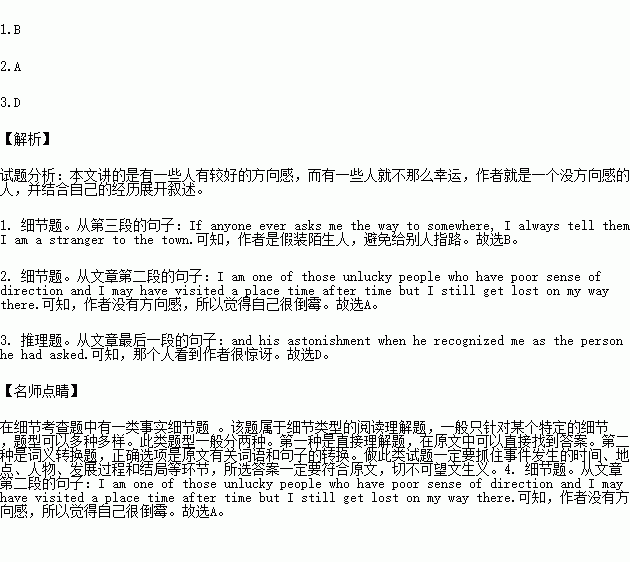题目内容
Some people are lucky enough to be born with a good sense of direction and even if they have only visited a place once, they will be able to find it again years later.
I am one of those unfortunate people who have poor sense of direction and I may have visited a place time after time but I still get lost on my way there. When I was young I was so shy that I never dared ask complete strangers the way and so I used to wander round in circles and hope that by some chance I would get to the spot I was heading for.
I am no longer too shy to ask people for direction, but I often receive replies that puzzle me. Often people do not like to admit that they didn’t know their hometown and will insist on telling you the way, even if they do not know it; others, who are anxious to prove that they know their hometown very well, will give you a long list of directions which you can not possibly hope to remember, and still others do not seem to be able to tell between their left and their right and you find in the end that you are going in the opposite direction to that in which you should be going.
If anyone ever asks me the way to somewhere, I always tell them I am a stranger to the town in order to avoid giving them wrong direction but even this can have embarrassing results.
Once I was on my way to work when I was stopped by a man who asked me if I would direct him the way to the Sunlight Building. I gave my usual reply, but I had not walked on a few steps when I realized that he had asked for directions to my office building. However, at this point, I decide it was too late to turn back and search for him out of the crowd behind me as I was going to meet with someone at the office and I did not want to keep him waiting.
Imagine my embarrassment when my secretary showed in the very man who had asked for directions of my office and his astonishment when he recognized me as the person he had asked.
1.What is the writer going to do when someone asks him for direction?
A. He will direct the right way to the person willingly.
B. He will reply to it by the means of being a stranger to the town.
C. He will give the very person long list of direction.
D. He is going to show the man an opposite direction.
2.Why did the writer consider himself to be an unlucky dog?
A. Because of his poor sense of direction.
B. Because he always forget the way to home.
C. Because he did not have any friend.
D. Because he used to be shy and dared not ask others the way.
3.How did the visitor feel when he was showed into the very room?
A. He felt strange.B. He felt embarrassed.
C. He felt very sad.D. He felt astonished.


 ) 并在其下面写出该加的词。
) 并在其下面写出该加的词。